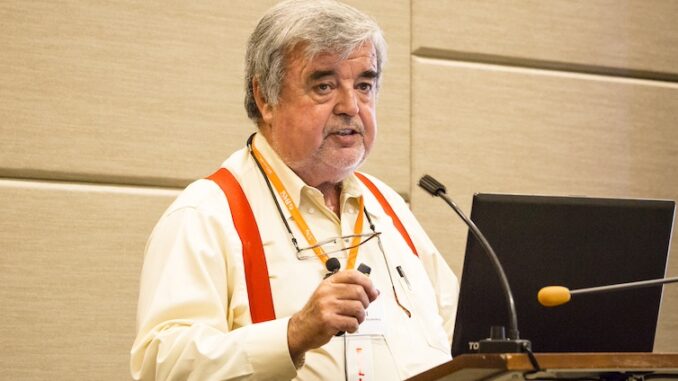by Sean Adl-Tabatabai, The Peoples Voice:

Nuclear scientist Digby Macdonald has sparked controversy by labeling global warming a “depopulation hoax,” asserting that carbon dioxide (CO2) does not primarily drive temperature changes. In a bold challenge to mainstream climate narratives, he argues that rising temperatures precede CO2 increases, undermining claims of human-driven climate change.
TRUTH LIVES on at https://sgtreport.tv/
During a recent episode of EpochTV’s Bay Area Innovators, Macdonald explained his theory using the analogy of a carbonated drink: as temperature rises, the drink releases CO2 faster, causing it to go flat. He contends this natural sequence of events in the environment suggests that global warming is being misrepresented to serve ulterior motives, calling for a reevaluation of climate science assumptions.
Epoch Times reports: “That’s the very reason why you put your beer in a refrigerator,” he said. “If you want the fizzy drink to be tangy … you put it in the refrigerator so the CO2 remains in the drink.”
Macdonald said one of the reasons for the change in climate is the Milankovitch cycle—the regular variations in the elliptical path the earth travels around the sun.
He said that cycle changes every 100,000 years and an ice age occurs when it’s the most elliptical because the earth is receiving a lot less solar radiation and heat.
This cycle, combined with the earth’s wobble and sunspot activity, are the drivers of climate, he said.
“There’s nothing that you and I can do about that,” Macdonald said. “That’s okay, because if we rely upon the historical record, we go through these maxima and minima.”
He said during the Roman period it was one of the maxima, in which temperatures were about two to four degrees higher than now, and there was a large advance in civilization.
He said the changes can be traced in history, which shows the temperature has swung all over the place.
“Right now, as far as temperature is concerned, we’re about a quarter of the way up between the low minimum and the high maximum,” he said. “So we’re still on the low side. So we’ve got a long way to go, and the changes are very small. We’re talking about, for instance, fractions of a degree centigrade.”
By analyzing the bubbles of gas trapped in arctic ice using spectroscopy, the concentration of CO2 can be found, while the temperature is reflected in isotopic distributions, Macdonald said.
With that, he said, it’s possible to determine what the CO2 level was as well as the coinciding temperature, at different points in time, including thousands of years ago.
“If you go back to a hundred and something years, people were skating on the River Thames in London. That was called the mini ice age, because the temperature dropped to quite a low value,” he said. “So we’re actually recovering from a mini ice age, and so the temperature’s got nowhere else to go but up, and that’s what it’s doing at the moment. It’s got nothing to do with CO2.”
Macdonald said that all the money spent on programs blaming CO2 for climate change is based on politics, and the money would be better directed toward more pressing societal issues such as health care and homelessness.
He said the data doesn’t support the reports published by the Intergovernmental Panel on Climate Change (IPCC), the United Nations body that says CO2 is the culprit for climate change.
If the IPCC were correct, he said, you would find a situation where the CO2 rises first, being the cause, and the effect is the rise in temperature. He said they didn’t check the causality relationship to see if that’s valid.
“That’s what I did,” he said. “I found out that in fact, the temperature rises, and then the CO2 comes out.”
“Water vapor [is] the only gas in the Earth’s atmosphere that keeps the Earth warm,” he said, referring to a paper by Douglas Lightfoot.
Macdonald said the impacts of CO2, methane, and nitrogen oxide are immeasurable.
In an article, Macdonald wrote that Lake Vostok in Antarctica has the most extensive ice core records, and close examination of the temperature changes and atmospheric CO2 records shows that the temperature fell before the CO2 level did.
Read More @ ThePeoplesVoice.tv



